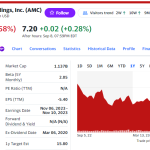Google faces its biggest ever legal challenge in a Washington court on Tuesday, as it fends off accusations from the US government that it acted unlawfully to build its overwhelming dominance of online search.
Google has been accused of being evil by some people for a number of reasons, including:
- Its monopoly power: Google is the dominant search engine in the world, with over 90% of the market share. This gives Google a lot of power over what information people see and how they interact with the internet.
- Its data collection practices: Google collects a vast amount of data about its users, including their search history, location data, and browsing habits. This data is used to target ads to users and to improve Google’s products and services. However, some people worry that Google is collecting too much data and that it is not doing enough to protect user privacy.
- Its political bias: Google has been accused of censoring conservative viewpoints in its search results and of favoring liberal causes. This has led to accusations that Google is trying to manipulate public opinion.
- Its impact on society: Google has been accused of contributing to the spread of misinformation and of making it harder for people to find reliable information. Google has also been accused of contributing to the rise of social isolation and loneliness.
These are just some of the reasons why some people believe that Google is evil.
Over ten weeks of testimony involving more than 100 witnesses, Google will try to persuade a federal judge that the landmark case brought by the Department of Justice is without merit.
The trial is the biggest US antitrust case against a big tech company since the same department took on Microsoft more than two decades ago over the dominance of its Windows operating system.
“Technology has progressed a lot in 20 years so what results from this case will have a strong bearing on how tech platforms operate in the future,” said John Lopatka, from Penn State’s School of Law.
The Google case centers on the government’s contention that it illegally forged its domination of online search by entering into exclusive contracts with device makers, mobile operators and other companies that left rivals no chance to compete.
Through these payments of billions of dollars every year to Apple, Samsung or carriers like T-Mobile or AT&T, Google secured its search engine default status on phones and web browsers and allegedly guaranteed its success to the detriment of competitors.
“Two decades ago, Google became the darling of Silicon Valley as a scrappy start-up with an innovative way to search the emerging internet,” the Justice Department said in its lawsuit. “That Google is long gone.”
The biggest alleged victims in the case are rival search engines that have yet to scratch out a meaningful market share against Google, like Microsoft’s Bing and DuckDuckGo.
– 90 percent share –
Google remains the world’s preeminent search engine, capturing 90 percent of the market in the United States and across the globe, much of which comes through mobile usage on iPhones and phones running on Google-owned Android.
In its defense the company contends that its success is due to the unbeatable quality of its search engine that has been judged a cut above the rest since its launch in 1998 by founders Sergei Brin and Larry Page.
“In sum, people don’t use Google because they have to — they use it because they want to,” said Kent Walker, Google president of global affairs in a blog post.
The trial will be presided over and decided by Judge Amit P. Mehta, whose ruling would come many months after the roughly three months of hearings.
The stakes for Google are enormous if Mehta upholds any or all of the US government’s arguments.
Remedial action could involve a break up of Google’s far flung business or an order to revamp the way it operates.
The company has faced major legal action in Europe, where it was fined more than 8.2 billion euros ($8.8 billion) for various antitrust violations, although those decisions are under appeal.
Whatever Mehta ends up deciding, the US case will almost certainly be appealed by either side, potentially dragging the case on for years.
Launched in 1998, Washington’s case against Microsoft ended in a settlement in 2001 after an appeal reversed an order that the company be split up.
The US government launched its case against Google during the Trump administration and the suit carried over in the transition to President Joe Biden.
Biden has also made a point of challenging tech giants, but with little to show for it.
In January, Biden’s Department of Justice launched a separate case against Google involving its advertising business and this could go to trial next year.
The company also faces other lawsuits from US states that accuse it of abusing monopolies in ad tech and for blocking competition in its Google Play app store.
Google and the states said on Tuesday that they had reached an agreement in principle to settle the Google Play case.
Shayne Heffernan









